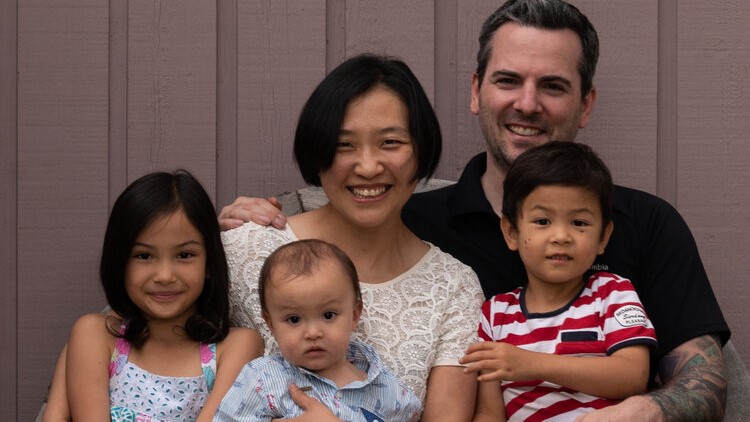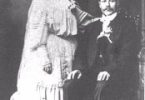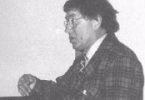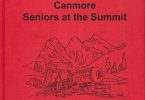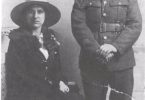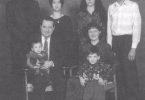This is an oral history that was conducted by the Canmore Museum on July 27, 2020
CM: Okay. Well, first of all, thank you for taking the time to talk with me.
Yanli: Thank you.
CM: Yeah, you’re welcome. Um, so first of all, can you just say your full name please?
Yanli: Yeah, it’s Yanli Reid. Y A N L I. The last name is R E I D.
CM: It’s 12:05 PM on July 27th. First of all, just tell me how you’re doing Lilly.
Yanli: I’m doing very well. Thank you.
CM: What does a day look like for you right now?
Yanli: It’s so sunny and super warm in Banff [children making background noise].
CM: Oh, you’re in Banff. Oh hi dude. Yeah. There’s a small man there.
Yanli: Yes, I have kids.
CM: So tell me, what does your schedule look like on an average day now?
Yanli: Okay. After quarantine, because the Banff park opens now, I have a bed and breakfast in the basement. So I usually get up before nine o’clock and get my kids, everybody has breakfast and so on. And by 10:30, my guests have checked out. So I go downstairs and- [to child] go play outside now, please. So it takes me about two, three hours, everyday. I have friends over, and we have playdates for kids. And then after when it’s two or three o’clock, we just hang out and have lunch together, the kids have play dates, and then we’ll take them to a playground, for the evening, four to three hours every day. And then the day is almost over.
CM: No kidding. That sounds really busy.
Yanli: Yeah. It’s easy with kids and also with business. Yes.
CM: Yeah, totally. Are you married? Do you have a partner?
Yanli: Yes, I have a husband.
CM: You do you have a husband. Does he work inside the home? So quarantine is eased a little bit now, how is your life different? How is your life different now than it was three months ago?
Yanli: Yeah, he started working from home in Mid-March. So he used to work at Fort McKay, you know, it’s a little town.
CM: Yeah. Wow. Okay, so very far north.
Yanli: You fly in four days on, three days off. Now he works from home. We transformed our guest room into an office, which is great because we have him much more than before in the week. However, since this week he has started going back to the site again. Today is Monday he’ll go back, and then come back Thursday evening.
CM: Oh, okay. What did you say? Four days on how many days off?
Yanli: Three days off. So Monday through Thursday at the site, Friday to Sunday at home.
CM: Okay. So that must be nice for him to go back to work, and nice for you guys to have that space again.
Yanli: No way, we wait the day he comes home. [laughter]
Amy: Oh yeah, you’re missing him for sure. So for you with your kids, they were in school. How old are your kids?
Yanli: Uh, eight. Five and one half.
CM: Okay. So what was it like teaching them from home? How did you feel about that?
Yanli: Homeschooling?
CM: How was that?
Yanli: That was tough. Pretty tough for my daughter, because I only had one that kid was taking grade two, the middle kid hasn’t taken kindergarten yet. In September he will start kindergarten. So fortunately I only have one kid that I need to be homeschooling. But I’m not very motivated, so it’s challenging. [laughter]
CM: So you had trouble getting her to do her work?
Yanli: Yeah.
CM: Yeah, I bet. When lockdown first started for you, how did things go? How did you feel when you first heard that we were going to be in quarantine for a long time? Just tell me a little bit about your experience.
Yanli: Right. As a beginning I felt pretty good, because finally I can slow down a little bit. My life was so busy with kids, going to school, everything. We were excited for just a one week and then thought, “Oh, this is so lonely.” And then being apart from friends and the missed classmates. It felt a little hard. And then we started hiking a little bit in the park. So we found it a little more exciting again. So kind of up and down, pretty interesting, so I remember a certain week. I started texting all my friends and I got a little crazy. I felt, “Oh my God, I miss you guys. This is crazy.” I came out of quarantine and I’m happy again, because we went out to see so many things that we never did before because Banff is always so busy, and in summer I always had business. So we got an opportunity to explore the area, and we thought “Wow, my God, it’s beautiful.” And then after that we settled down a little bit. And we started having play dates little by little, and then the park opened and our life is getting back to normal and busy again.
CM: Yeah. Well, it’s funny now that the Park’s open, it feels like a regular summer.
Yanli: Yeah, it’s beautiful. So in a usual summer, I take kids to swimming and do some activities, but now those facilities are not available. So I got some swimming, like a water water thing, in my yard.
CM: Like a pool. With your business, so you run a Bed and Breakfast, do you provide food for your guests or is it just a room, a place to stay?
Yanli: I provide the basic items. I get a bag of bread, and the milk and eggs, and coffee and tea, and oatmeal, cereal, those kinds of things. Basic items.
CM: So how has it been running your business during quarantine?
Yanli: It’s very interesting, because all my guests canceled their reservations because they were from the States mostly, or international guests. But they all cancelled for May or June, because I only run in the summertime. So May was when everybody cancelled and I got to have a break. In June and July they all cancelled, because they are not able to fly in. So now I put in half price for Canadian people, because it’s Canadian’s turn to travel. So all my guests are from surrounding areas or flying from Toronto. So it’s very exciting and interesting because now it’s Canadian guest, their turn to travel.
Amy: Do they have their own entrance? I’m just curious how you’re managing physical distancing and stuff like that.
Yanli: Oh, I see. It’s a bungalow and I have a two bedroom apartment downstairs. They have their private entrance. So pretty much clean everything, and they only stay for one night or two nights. During their stay I don’t go in, but once they get out, I clean it throughout, very carefully. Because in a B&B most of the concern is cleanliness, I always cleaned and now it’s just extra clean, I do deep cleaning once a month before, or every two weeks before, deep cleaning, now I wash carpet more often, and also use bleach more. So just very clean.
Amy: Yeah. Well, it makes sense. When you stopped getting guests at your B&B, was that going to be financially tough? Was that a problem? Do you depend on the income from the B&B? What was that like? Were you worried?
Yanli: No, because it’s my home actually, so we could have survived without the B&B and the rental income. But for sure it was tight, before I always had savings, but, during quarantine we would just feel, “Wow, we just got to buy it.” And we used to spend quite a bit on kids and so on, and during quarantine I remember, “Okay, no activities”, because they have so many activities outside of school, and during the quarantine month it’s good that there’s no activities because our money’s just enough to get by, we don’t have so much savings anymore. But we are ok without it.
Amy: You’ll be okay. Well, that’s good to hear.
Yanli: Yeah.
Amy: What was the hardest part of quarantine for you? What did you struggle with the most?
Yanli: Oh, I’m pretty social. I love friends. I remember my only downside was the second week, I think was missing everyone. I felt, “My goodness. I need to talk to my friends”. And also my kids, it was awkward, and I miss everyone. So the emotion felt lonely.
Amy: Totally. What did you do to cope with that? How did you survive?
Yanli: Oh, I just talked through my phone using messenger or chat. All kinds of friends, I messaged them “How are you doing? Hi.” So many people and yeah. So I just got through with talking, that’s it. Once I got busy with hiking I felt great again. And now I feel totally great, overwhelmed sometimes because I have guests to talk to. And also, I always [00:11:00] have friends over for playdates, so I don’t feel lonely at all, just busy.
Amy: Just give me one sec here. I’ve lost my- Oh, here we go. When you guys were locked down together and you were all stuck in the same household, was there any fighting between family members? Was it hard for you to have your husband home? Tell me about what that was like.
Yanli: Oh yeah. It’s funny. We really appreciate that, we always joke that friends can actually make her life a lot better because, before during the week my husband was never able to be home.
So I am alone with three kids, but they’re quarantined and they’re always around, but the only downside is I have to cook more, clean more, and to serve him coffee, but he’s at work and super busy. So he always shuts the door and work 12 hours there so no help there. However after work I can get his assistance and yeah, it was good. At the same time, a little bit extra work for me for cooking and cleaning.
Amy: Where are your kids? How did your kids do? Was everyone pretty crazy and cooped up?
Yanli: My daughter, she didn’t like school so much, the academic part. So she was so happy, “Finally, I can get out of a school”, like that, but then she realized homeschooling is the worst. It’s worse, it’s more boring she said, and she really needs her friends. Yeah, but not too bad. I feel the same as me, at the beginning they were so happy and then after a long time they miss everyone, and then they they felt okay. And now they’re totally fine.
Amy: So how did you feel when gradually the province started to reopen and you could start seeing people in person again? Stuff like that. How did that feel? How did that go for your household?
Yanli: A lot of people are very nervous about it. But for me, to be honest, I always go with the flow. I don’t want to put the extra stress on myself, so I just be careful washing my hands and wearing a mask when I go out, but I don’t worry about anything. I have a B&B, so if they come, they come. If the park is closed, I just go with the flow.
Amy: Right.
Yanli: I really like enjoying my life as well. So some kids, probably their parents, don’t feel comfortable sending their kids to the park, but I just take my kids to the playground every day and let them have play dates. I feel that’s my limit. I cannot be depressed.
Amy: Right, you need to be social and keep doing your life to stay happy.
Yanli: Yeah. That’s my standard.
Amy: Yeah, totally. So you aren’t Canadian originally, right?
Yanli: That’s right. I’m Chinese. Yes, I’m a permanent resident.
Amy: You’re a permanent resident. Okay. How long has it been in Canada?
Yanli: I came here 2002, so 18 years. .
Amy: wow, you’ve been here for a long time. So is your family still at home in China? Your parents?
Yanli: Yeah, everybody is in Beijing.
Amy: In Beijing. So China is a bit of a stressful place to be right now. How did you feel being apart from your family? Were you worried for them?
Yanli: No, actually it’s not stressful. I think the situation is being locked under control very well. They don’t have new cases, like Alberta even. So they are all very healthy and happy and they are just very used to wearing masks. Now everybody just is really careful with social distance and masks, but they’re not as stressed out, they go to the park every day.
Amy: Right. So you’re feeling quite comfortable with your family at home.
Yanli: Every summer my parents come over to help me with the kids and the business, but this year they have to stay there. But that’s all.
Amy: So you must be missing them then. Yeah.
Yanli: Yeah,
Amy: Do you think your kids really understand what’s happening? Tell me more about that.
Yanli: Yes. They know what’s going on. [00:16:00] They apply social distancing so well with other friends when people come over. But once they go out, they know they need to wear a mask and it’s a virus going on. Yeah. They know.
Amy: Right. So they understand. Well, some of them are fairly old, I guess. The older you get the easier it is to understand what’s happening. This has changed everybody’s lives, right? How do you think this will make your life different in the future, and your kids’ lives?
Yanli: Yeah, I don’t know. To tell the truth it’s very hard to tell the future? It’s very sad. I’m Buddhist actually, so I try to be vegetarian and also I tell [00:17:00] the kids we need to protect our planet, and I think it’s kind of karma. Like the universe charged the human race, with this virus, or like a punishment.
So I just tell our kids to be kind and respect life, always respect life. So that’s all. Because I believe in karma, and caring, loving, and kindness. So that’s all I can tell my kids and myself. I really cannot tell the future, I don’t know what’s going to happen now to tell you the truth.
Amy: True. No, I don’t think anybody does. So what are you going to do if we have to lock down again? How do you feel about that?
Yanli: Yeah, again, I just go with the flow.
Amy: Well, that I think [00:18:00] is a good way to look at it. There’s nothing else to be done really.
Yanli: I don’t think I want to protest against the government decision, I just go with the flow, whatever they decide. I try my best to live my life though.
Amy: Yeah, totally. I only have one more question for you, which is, this interview, this is an opportunity to speak directly to people in the future. People will read these interviews and they will listen to them. So if you had a message that you wanted to share with people reading this 50 or 100 years from now about your experience, what would you want them to know?
Yanli: Oh. [laughter]
Amy: I know it’s a tough question.
Yanli: I really believe this is a lesson for our human race. I really believe in karma, so I think we all should all love life and respect and be kind to each other. Things can get better and better. Have hope. Believe.
Amy: Yeah, absolutely. Is there anything else that you think that I should know about your experience or what you think is going to happen? Or do you feel like we’ve captured your experience accurately?
Yanli: Yeah, that’s all I can think of. I think we covered all the aspects quite a bit. [laughter]
Amy: It’s interesting because I’ve been doing these interviews basically since the pandemic started. So it’s been like four months now and it’s very different talking to people now than it was talking to them in April.
Yanli: I can’t imagine. Positive probably.
Amy: People definitely feel happy to be with their friends and their family, but many people are also worried that there’ll be a second wave, so we’ll see what happens. Well, it was very nice to meet you, Lily I hope that you guys keep healthy and happy at home and that you enjoy your time together and stay safe
Yanli: We love our family, and spending time with them.
Amy: It looks like family is very important to you, and your kids and your husband are very important to you.
Yanli: I really believe family is the most important. We have each other.
Amy: I have one last question. I forgot to ask it, but it reminded me. Are you frightened of anything? What are you scared of?
Yanli: I’m not scared of anything.
Amy: Yeah. You’re not worried?
Yanli: I believe in Buddhism, I just feel life is a circle. And if anything is to happen to me, it’s meant to be. I just do good deeds. I can change my fortune a little bit for the better, but I’m not as scared of it.
Amy: Right. Totally.
Yanli: If I get the virus, it’s meant to be.
Amy: Well it sounds like you are feeling pretty relaxed about the whole thing then.
Yanli: I’m not stressed.
Amy: Well, that’s good to hear. I look forward to talking to you again hopefully one day, and seeing how things are going. Lily, thank you a lot for your time. So nice to meet you.
Yanli: Okay. Yes. Nice to meet you.
Amy: Enjoy the weather. Bye bye.
Yanli: Thank you. Okay, bye.
The Stories of Resilience project offers deeply personal insights into the lives of Bow Valley residents during the COVID-19 pandemic. They each share their unique challenges, fears, hopes, and lessons learnt during this unique time in history. This project was brought to life by a collaboration of local organizations: Bow Valley Immigration Partnership (BVIP), artsPlace Canmore, Kristy Wolfe Photography, Canmore Museum. With special thanks to Community Connections in the Bow Valley.
Explore More Stories of Resilience
